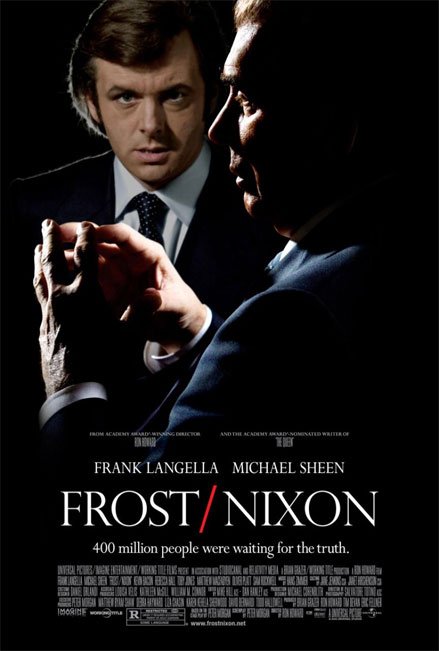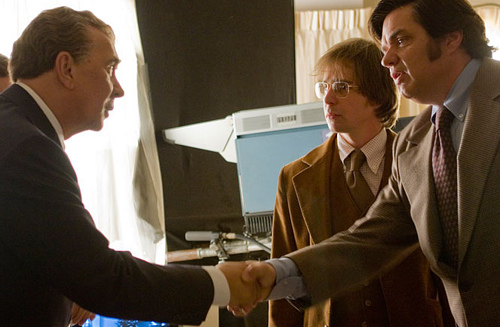Oscar Week: Frost/Nixon (Ryan’s Take)
Every once in a while, a Hollywood producer spends an evening at the theater and returns with his next film project. While the play may be great, its cinematic simulacrum is often subpar. Sometimes horrendous.
Maybe the filmmakers don’t understand what made the original work, maybe they’re just out to trade on the original’s popularity, or maybe there’s just a certain indefinable spark that only live theater can ignite.
But despite this track record, I support these adaptations. Partly because I believe that theatrical stories should be captured in a permanent medium, and partly because every once in a while, as in the case of Frost/Nixon, the result is a legitimately good film.
This is the story of British television presenter David Frost, the man who landed the first post-Watergate interview with Richard Nixon. Frost has to get something exciting and preferably incriminating out of Nixon to make the interviews a ratings success. Nixon has to appear innocent and noble to regain America’s acceptance. It’s Frost’s last chance to rejuvenate his career and Nixon’s last chance to return to the public sector. As Nixon says, only one of them can win.
And so the battle begins. And by battle I mean two guys talking to each other. Aside from a batch of added and rejiggered scenes intended to make the story more cinematic, Frost/Nixon sticks unashamedly close to its stage roots by being composed almost entirely of long conversations in hotel rooms. Very luckily for the audience, the performances are engaging enough to sustain this formula.
Michael Sheen and Frank Langella (both veterans of the stage version) are equally powerful. Sheen aptly contrasts Frost’s ever-confident exterior with his increasing desperation as arranging the interviews becomes more and more challenging. Langella does the impossible by giving us a Nixon who is sympathetic. Calculating and ruthless, yes, but not the monster that the film could have easily made him into. The supporting cast is on their game as well, especially Sam Rockwell who is absolutely exceptional as the obsessed and frustrated author who has dedicated his career to getting a public apology from the former president.
So it’s damn compelling is what I’m saying. But it’s not without its faults. The movie is pretty up front about the fact that everything is leading up to the Watergate confrontation. Starting from the first ten minutes of the film, when this becomes clear, and lasting to the final ten minutes of the film when this actually happens, you’ll be playing the waiting game.
That’s not to say the bulk of the film is boring. I really felt for David as he struggled to make the interviews a reality while his stable talkshow career was falling apart around him. I was interested in the remains of Nixon’s post-presidential career, speaking at cheap corporate events while scheming to use the Frost interview to get back on top. But I couldn’t help thinking, “Yeah, I get it, let’s get to the good stuff!” This caused the second act to drag, leaving many scenes feeling like a roadblock in my path to the payoff. When the payoff did arrive, it was spectacular. But it was also so short that I wondered if it had all been worth it.
Ultimately, it had. Frost/Nixon displays performances of a rare caliber. And the knowledge that the events (while tweaked a bit) are factual makes it all the more fascinating and satisfying to watch, even if that satisfaction is delayed.
Rating: 









7 out of 10
One last thing. Ron, I’ve stuck up for you several times in the past. In fact, I came to your defense on this issue during a chat with a coworker a few weeks before seeing Frost/Nixon. But as of this film, I am finally and officially tired of Clint. It’s getting distracting.



